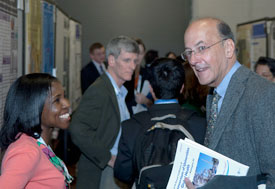NIH pursuing unprecedented opportunities in global health
March / April 2013 | Volume 12, Issue 2
There are "phenomenal, unprecedented opportunities" for advances in global health research, the NIH director recently told attendees at the Consortium of Universities for Global Health (CUGH) annual meeting in Washington, D.C.
"Science is moving forward rapidly, new doors are opening all the time," said NIH Director Dr. Francis S. Collins. "NIH involvement in the global, as well as domestic, health arena is more essential now than ever."
With its expertise, the NIH is well-placed to help other countries develop institutional research and training capacity so they can participate in tackling persistent and emerging global health problems. "We really need to come up with ways to build those institutions, build that capacity, get the training in place, so there is a critical mass of expertise, so that going down the road, the research that needs to be done in these low- and middle-income countries can be done by researchers who are in the middle of those communities," Collins said.

Photo courtesy of CUGH
Top NIH officials spoke about their organizations' many successes
and opportunities in global health research at the recent Consortium
of Universities for Global Health meeting.
Even as the NIH pursues new drugs and treatments, low-resource populations are seeking access to proven interventions, noted Fogarty Director Dr. Roger I. Glass. "We've seen at NIH the development of many innovative therapies, like the HPV vaccine, yet we've done less well at implementing these in the developing world," he said. "There's clearly a research agenda about how we can do this."
Today's increasingly complex biomedical enterprise requires expertise in a broad range of disciplines. "Global health today is not just relegated to a medical school or a school of public health; it needs to include bioengineering, business, law and economics - and even undergraduates are involved," Glass noted. "It's a completely different picture of who we need to train to help us in the 21st century."

Photo courtesy of CUGH
Fogarty Director Dr. Roger I. Glass discusses
posters with students at the 2013 Consortium
of Universities for Global Health (CUGH) meeting.
Strategic, multidisciplinary partnerships are vital as researchers map the genomes of microbes, gain insight into pathogenesis and identify new targets for diagnostics, drugs and vaccines, said Dr. Anthony S. Fauci, director of the National Institute of Allergy and Infectious Diseases (NIAID).
The success of science to combat HIV, he said, shows "when you concentrate attention, resources, political will and good fundamental basic science on the problem and ultimately translate that into effective interventions, you can do what some people think is impossible."
The NIH and others in global health research must aggressively form partnerships to tackle fields that private industry eschews, said Dr. Susan B. Shurin, National Heart, Lung and Blood Institute (NHLBI) director.
As life expectancy rises due to better preventions and treatments for infectious diseases, the "fruits of victory" are emerging in the form of noncommunicable diseases such as diabetes, heart ailments and cancer. "If people live longer," she said, "they're going to have a whole different set of problems than they used to."
The burden of cancer in developing countries is a growing concern, according to National Cancer Institute (NCI) Deputy Director Dr. Douglas R. Lowy. "We have an obligation" to act, he said. "The research opportunities really are enormous." He cited the success of NCI research in helping produce a vaccine against the human papilloma virus (HPV) that causes cervical cancer. Clinical trials conducted in Costa Rica, where there is a high prevalence of HPV, showed the vaccine reduced deaths by 50 percent. Research in tobacco cessation is also essential to lowering the global cancer burden, he said.
Substance abuse contributes to ill health in many ways, from cardiovascular disease to HIV/AIDS. National Institute on Drug Abuse (NIDA) Director Dr. Nora Volkow said her Institute plays a key role in sharing information globally. "One of our no-brainer investments is training scientists in other countries," she said. "Knowledge should have no boundaries."
It's critical that NIH remain at the forefront of research and training, Collins maintained. "We are now a global community. Let's not make any mistake about it. Diseases can travel across country lines. Noncommunicable disorders we used to think about as Western are now becoming a major cause of morbidity and mortality in the developing world," Collins observed. "We're all talking about the same things. Let's figure out how best to get research done that will help the most people."
More Information
To view Adobe PDF files,
download current, free accessible plug-ins from Adobe's website.